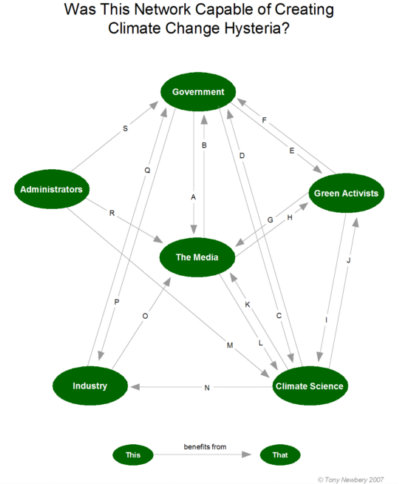
William Hogarth Election Celebration
This post is in response to a number of comments made by regular contributors to Harmless Sky on the Tory Environmentalism – is everybody listening? thread. Here, Here, Here, Here.
Geoff Chambers says, ‘There’s a fascinating debate to be had on the effect of the current global warming catastrophe on British politics and media coverage …’ And of course he’s right.
We’re approaching the first general election that is likely to bring about a change of government in over a decade, and the previously remorseless march of AGW alarmism is beginning to falter, so how could it be otherwise? It would be difficult to get a cigarette paper between the three main party’s policies on this subject, but opinion polls constantly show that the politician’s apparent certainty is not shared by the electorate. Something has to give.
Geoff then goes on to consider the role of politics on this blog, assuming that this area of discussion is entirely off limits. That is not the case.
What the blog rules actually say is:
Politics:
It certainly isn’t possible to discuss climate, the countryside and landscapes without straying into this minefield, although I wish that this was not so. Please try to be reasonably moderate in your utterances and avoid party politics altogether. There are plenty of other blogs that deal with such matters.
This is an un-moderated blog, but when I do occasionally step in editorially, it is almost always because discussion of a political aspect of climate change has drifted on to other unrelated political issues, got heated, and ended up a long way from the subject matter that Harmless Sky is intended to cover.
I have particularly requested that contributors should avoid party politics as there are few people who can conduct a party-political debate objectively, and a rough-house that creates much heat and very little light usually ensues. This kind of thing may be fun for those directly involved, but it tends to be tedious if you have to read it, and I do have to read it.
For at least the next six months (assuming that the election takes place in May) I’m prepared, in fact eager, to see comments drawing attention to any differences that may emerge in the various parties’ policies relating to climate change, or any other environmental issues for that matter. However that does not mean that discussion of the Labour Party’s latest green initiative will be allowed to become a knock-down-drag-out fight over the relative economic competence of the main parties, or whether the prime minister is attempting to subvert democracy. And I am all too familiar with the trick of rounding off a five paragraph rant about foreign policy with a spurious reference to alternative energy. Such efforts are likely to be snipped in toto.
You have been warned.
That said, I would not be surprised if the coming election campaign provides the opportunity for the blogosphere to really come of age. Time strapped journalists rely more and more heavily on recycling press releases without proper investigation, or consideration of the motives of those who provide them. This is leaving huge gaps in the spectrum of news and opinion that the MSM covers, and the range of opinions that it considers. There is so much that concerns people that rarely, if ever, receives any attention. Sometimes I think that large parts of the press are now like disk jockey’s who have become used to just reaching out to a carousel for the next disc , but never wonder when the contents of the carousel was last updated. We seem to hear the same old tunes over and over again.
As a result, there is an emerging trend towards the new web-based media influencing the news agenda. Just ask yourself whether Climategate could have happened without the blogosphere? Or whether the utter futility of the Copenhagen summit would have become apparent so quickly without there being an alternative to the deceptively up-beat spin flooding from governments and organisations that had most to lose as a result of its failure.
Geoff also says:
I’ve often felt the rough and tumble of blog discussions reproduces the long-lost art of political all-in wrestling, of the kind you see in Hogarth’s illustrations of 18th century election campaigns. The point wouldn’t be to score party political points, but to get some heat into the discussion …..
This conjures up an intriguing image, but I doubt whether he really thinks that political persuasion with the aid of a cudgel would reinvigorate political life. On the other hand, it does seem likely that this election will be very different from those since 1997, and there may be copious amounts of metaphorical Hogarthian blood on the carpet before the campaign is over.
There seem to have been two distinct types of election in recent history. Firstly, there are those where the electorate hardly seem to be interested in the outcome because they expect the status quo to be maintained regardless of who wins. Such elections are characterised by unremarkable political leaders and a desire to see no more than a minor touch on the helm of the ship of state. Then there are elections that take place when the whole nation is galvanised by the possibility of a major change in the fundamental priorities that determine public policy. The elections of 1948, 1963, 1987, and 1997 are examples. It seems possible that, in due course, 2010 will join their ranks, but in this case there may be one very important difference: important issues that concern the public may not being addressed at all. Blogs can help to prevent this happening.
In another post, I mentioned an article by Matthew d’Ancona that castigated the political classes, and all parties, for arrogantly failing to engage with the public and acknowledge their views because they are inconvenient. The examples he chose were the MP’s expenses scandal and global warming. The days when MP’s could afford to ignore what is discussed on blogs is over, and the large proportion of new members that will be elected this year are far more likely to be aware of this than those who they will be replacing.
Just a year or two ago, bloggers endlessly discussed what was in the MSM, but had little impact on the news agenda. There was little or no sign that mainstream journalists and editors were interested in what bloggers said or did. As each month goes by the influence of the blogosphere is increasing because more and more of the public are seeking news and opinion on the internet rather than on paper, television or the radio. The MSM now have to compete for the audience not just among themselves, but with a whole new world of output.
In a blog post on the BBC website, Andrew Neil – as experienced a journalist as you can expect to find – has drawn attention to this point. His extremely hard hitting round-up of all the tribulations that have beset the once cosy and complacent world of mainstream climate science since the release of the CRU emails includes this obsevation:
The bloggers, too easily dismissed in the past, have set the pace with some real scoops — and some of the mainstream media is now rushing to catch up.
The Dam is Cracking
Wise editors understand what their readers want, either instinctively or by spending money on market research. Looking at where the heavy blog traffic is to be found can be much cheaper than commissioning opinion polls and focus groups. In the case of climate change, the mere number of web sites that deal with this subject from a sceptical point of view, and the traffic they get, must tell them something. They will also be aware that when they publish articles about global warming on their own websites, a large proportion of the comments they receive are sceptical.
Opinion polls show that the UK public rank concern about global warming very low in their list of priorities, but when it comes to policies that will lead to higher fuel bills, increased taxation, despoliation of the countryside, restrictions on travel and massive payments to the developing nations that is a very different matter. The public are very interested in these issues.
It is unlikely, if Matthew d’Ancona is right and politicians are so immersed in their own bubble that they have become divorced from the electorate, that climate change will play any greater role in the UK general election campaign than it has in recent by-elections, council elections and European elections unless somethng happens to dispel their complacency. If there is an outcry in the MSM against expensive proposals that will supposedly avert climate change, that would be something the main political parties would be unable to ignore.
Geoff is probably right, a rumbustious and widely populist outcry on the net could have an effect, not directly, but as a result of the message that it would send to the MSM, and if they fall into line then there is no way that politicians will be able to duck these inconvenient issues.
If Geoff’s dream of a truly Hogarthian election campaign comes true, I would not want to be part of it, but relying on the same period in history, there is a very obvious parallel that can be drawn between the 18th century pamphleteers and bloggers. In both cases radical voices became audible because concerned individuals were able to mobilise cheap means of mass communications to spread their views. And there is another similarity. Their pamphleteers ideas only spread because their publications were passed hand-to-hand, in much the same way that information on the net goes viral and spreads by links from site to site.
Although the notion of a rumbustious, rough and tumble 18th century style election campaign might have its charms, it would be unwise to take this analogy too far. Radical politics in the 18th century culminated in the French Revolution.
Now, where’s that guillotine?



Recent Comments